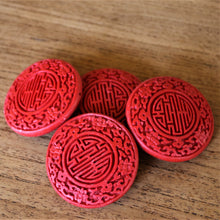Here we have a collection of four exceptional carved Siam Red coloured cinnabar pendants, which work exceptional well as the focal point for a necklace.
Although they are referred to as pendants made from the cinnabar crystal - they’re actually not cinnabar at all – they’re lacquered resin. (See below for the story).
The wear-anytime 52mm flat pendants allow for optimum creativity and will temper exciting jewellery prospects – such as a centrepiece to an ethnic-styled necklace you’ve just assembled from your special collection of beads from your jewellery-making bead box!!
Or you could attach it to your key ring, so you never lose them again!
Regardless, these cinnabar pendants – which weigh in at 128 grams will provide the astute beader and artisan a challenge and the perfect opportunity to create on an unparalleled scale.
The pendants work out to be $6.00 each, plus postage.
The accompanying photos illustrate exactly what to expect in your order.
The Cinnabar Story – and a little bit more ... Genuine cinnabar is actually a blood-red mineral stone which has been prized for its rich Siam red pigment ever since the 10th millennium BC.
It was later capitalised by the Romans who, who like the Chinese, used the powdered cinnabar pigment in pottery glazes and art, while the women of the day preferred to use the rich red substance as a cosmetic – becoming a form of lipstick.
However, over time, the people of the day began to realise this beautiful stone also contained high levels of toxicity due to its high mercury content.
It became dangerous for those who mined, processed and used the pigment; inhaling the poisonous mercury fumes affected the neurological functions of the body which, in many cases, led to a premature death, or at the very least, a shortened life expectancy.
With those days long gone, it was the Chinese who perfected the manufacturing of cinnabar beads and pendants, which have become so popular today.
Initially, they would apply a special-coloured lacquer – the sap from a tree - layer upon layer to specially carved pieces of wood.
Today – the process is slightly different. Hot coloured resin (instead of the tree sap) is poured into carefully carved design molds and allowed to set; the process is repeated again and again, until the desired thickness and texture is reached.
Although the process and material used has changed in modern times, the cinnabar namesake has remained intact.


![4pcs – 52mm Lacquered Siam Red Carved Cinnabar Pendants [E-46]](http://margriverbeads.com/cdn/shop/files/IMG_8159_2_{width}x.jpg?v=1708935782)

![Load image into Gallery viewer, 4pcs – 52mm Lacquered Siam Red Carved Cinnabar Pendants [E-46]](http://margriverbeads.com/cdn/shop/files/IMG_8159_2_110x110@2x.jpg?v=1708935782)